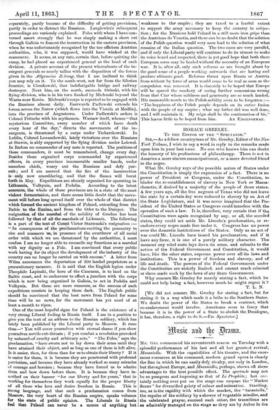HORACE GREELEY.
To THE EDITOR OF THE "SPECTATOR."
Sin,—As a fellow country man of Mr. Greeley, Editor of the Yew York Tribune, I wish to say a word in reply to the remarks made upon him in your last issue. No one who knows him can doubt the honesty of his professions of philanthropy. There is not in America a more sincere emancipationist, or a more devoted friend to the negro.
What Mr. Greeley says of the possible action of States under the Constitution is simply the expression of a fact. There is no power of President or Congress, under the Constitution, to hinder the re-establishment of slavery in Now York or Massa- chusetts, if desired by a majority of the people of these states. A few years ago, all the free negroes of Texas who did not leave the state by a certain day were reduced to slavery by an Act of the State Legislature, and it was never imagined that the Pre- sident of the United States or Congress could interfere with the operation of such a law. It is, therefore, very certain that if the Constitution were again recognized by any, or all, the seceded states, they could set aside Mr. Lincoln's proclamation, or re- enslave every negro made free under it. Congress has no power over the domestic institutions of the States. Only as an act of war could Mr. Lincoln have issued his proclamation, and if it have any force, it is one of a purely military character. The moment any rebel state lays down its arms, and submits to the action of the Federal Government and Constitution, it would have, like the other states, supreme power over all its laws and institutions. This is a power of freedom and slavery, and of life and death. The powers of the Federal Government under the Constitution are strictly limited, and cannot reach criminal or slave made such by the laws of any State Government.
Why censure Mr. Greeley for merely stating a fact, which be could not help being a fact, however much he might regret it ? T. L. N. [We did not censure Mr. Greeley for stating a fact, but for stating it in a way which made it a bribe to the Southern States. We doubt the power of the States to break a contract, which re-enslavement would involve. Americans seem to fancy that because it is in the power of a State to abolish the Decalogue, it has, therefore, a right to do it.—En. Spectator.]






























 Previous page
Previous page